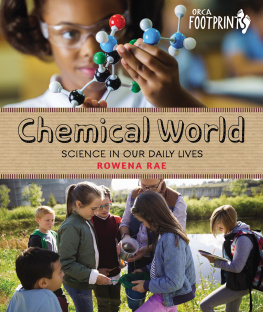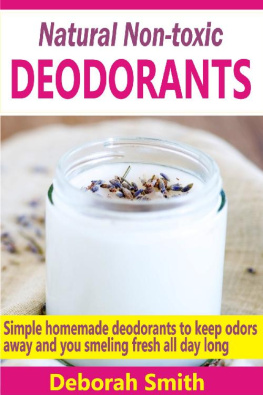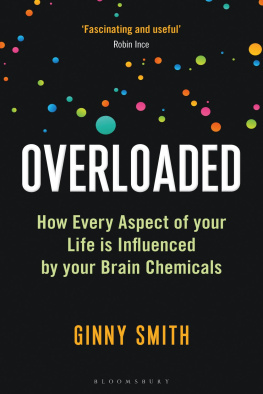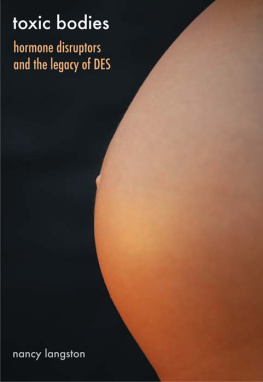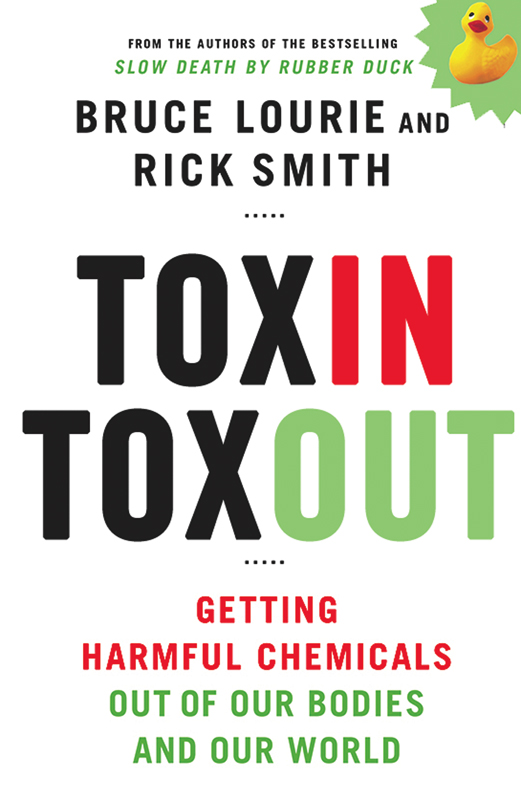
The author and publisher have provided this e-book to you for your personal use only. You may not make this e-book publicly available in any way. Copyright infringement is against the law. If you believe the copy of this e-book you are reading infringes on the authors copyright, please notify the publisher at: us.macmillanusa.com/piracy.
For Biz and Jen
CONTENTS
FOREWORD
BY FLORENCE WILLIAMS,
AUTHOR OF Breasts: A Natural and Unnatural History
WHEN I READ BRUCE LOURIE and Rick Smiths first book, Slow Death by Rubber Duck , I was first hooked by the best book title of the year and then won over by the authors originality, humour and passion. At the time I was working on my own book, about the natural history of breasts, and I, like so many readers, was fascinated and horrified by all the industrial chemicals coursing through our bloodstreams and body fat. How did they get there and what did it mean for our health?
In Slow Death , Lourie and Smith experimented on themselves, seeing if they could influence their exposures by changing their habits, diets and environments, such as by sitting in a room with a stinky carpet freshly sprayed with a stain-resistant coating. These off-gassing chemicals, like so many others found in everyday products, foods and materials, end up in our bodies, where they have the potential to build up and interfere with cell signalling and other biological processes. Some may act like hormones or damage DNA. Weve entered a new frontier of science, and not enough people or regulatory agencies are paying attention. But thanks to books like Slow Death and now Toxin Toxout this is starting to change.
A dozen years ago, the promise of health lay in genomics. Scientists decoded our genes, thinking they would unlock the secrets of disease. But it turns out that most of our genes are pretty excellent all by themselves. Its when the outside world communicates with our genes, changing how theyre expressed, that things become interesting. And the outside world is more complicated than ever before. Its now believed that a great number of diseaseseverything from autism to allergies to cancerare caused by genes and the environment acting together. Just as we once mapped the genome, scientists are now calling for a way to map our exposome, beginning in the womb. Where do we live and what do we eat and smoke and how high are the radiation levels?
Now that we are more alert to the uninvited molecular guests in our bodies, we increasingly want answers: how do we reduce our exposures to the most worrisome substances and how do we get them out once theyre there? People ask me these questions all the time. The reduction part is a little easier. If people want to take precautions, they can try to avoid microwaving plastics, for example, or avoid using heavily scented personal care products. But the toxout part is harder. From studies of people and marine mammals, we know that one of the best-known methods for removing toxic chemicals from your body is to deliver them straight to your infant through breastfeeding, but thats hardly comforting (and by the way, its my duty as a breast devotee to tell you that the benefits of breastfeeding still outweigh the risks). But wouldnt it be nice to get those chemicals out of there before the baby shows up?
I think most people would agree: The best solution is not to pollute ourselves in the first place; for example, by replacing risky substances with safer ones whenever possible in industrial processes. Thanks to governments and manufacturers in North America, weve already come a long way toward reducing our exposures to lead, benzene, asbestos, organochlorine pesticides, tobacco, radon and many other baddies. But there are plenty left to feel uneasy about.
So Im grateful for Toxin Toxout , the important latest installment of Lourie and Smiths work. With this book they have embarked on a fearless detox mission, wading through the often woo-woo world of cleanses, saunas, filters and chelation to see what, if anything, helps. They smelled some nasty stuff, got some needle pokes and Lourie even passed out. Detox isnt easy. Thanks, guys, we owe you one!
Florence Williams
Washington, D.C.
July 2013
ACKNOWLEDGEMENTS
THEY SAY THAT THE SECOND BOOK, album or movie is the most difficult. But what the heck do they know anyway? What about Led Zeppelin II, The Empire Strikes Back and The Two Towers , we thought to ourselves as we toiled to ensure that this second toxic tome was as well turned as the first. If weve succeeded, its because of the many people who gave so generously of their time to this complicated project. If we didnt, its entirely our fault.
We want to begin by thanking the extraordinary Random House of Canada team of Louise Dennys, Marion Garner, Amanda Lewis, Brad Martin, Matthew Sibiga and our editor, Paul Taunton, for their enthusiasm and incredible efforts as they brought this volume to life. Our agent, Rick Broadhead, made sure that the book project went smoothly; we even read our contract. Again, Kathryn Dean has corrected our grammar and punctuation, making us sound articulate.
Our employers, past and present, have always been co-conspirators in the best sense. At Environmental Defence, Canadas premier pollution fighters, thanks go to Bob Davies, David Donnelly, Aaron Freeman, Aviva Friedman, Stephanie Kohls, Gillian McEachern, Maggie MacDonald, Matt Price, Alanna Scott, Eric Stevenson, Deborah Sun de la Cruz and Sarah Winterton. Millions of Canadians continue to benefit every day from Environmental Defences groundbreaking Toxic Nation and Just Beautiful campaigns. Thanks to the members of the Just Beautiful campaign cabinet, especially Jennifer Ivey, Sarah Harmer, Donna Bishop, Lisa Borden (she of uptown herbal tea fame), Gillian Deacon, Wendy Franks, Sarah Jay, Trish McMaster, Brian Phillips, Joanna Runciman, Nicole Rycroft, Ersilia Serafini, Laurie Simmonds, Tracie Wagman and Dr. Shirley Zabol. The Ivey Foundation not only supports the work of numerous outstanding environmental initiatives in Canada, but also provides Bruce with the encouragement and freedom to pursue book writing and all that it entails, and for that, we are deeply grateful. Thanks to Ed Broadbent and the Broadbent Institute board and staff for recognizing that the economy of the future will be green and that we need to create jobs through reducing all types of pollution. This project would not have happened without the unflappable good humour and organizational moxie of Rachel Potter, who coordinated the complicated experimental logistics and kept us moving forward. There were some days when we couldnt even see her desk behind the piled boxes of incoming and outgoing experimental vials.
We would also like to gratefully acknowledge the generous support of the Catherine Donnelly Foundation, the J.W. McConnell Family Foundation and the Global Greengrants Fund for making this book possible.
We are appreciative of the staff at the Division of Biological Sciences of the University of Missouri; Chemir Analytical Services (Maryland Heights, Missouri); Pacific Toxicology Laboratories (Chatsworth, California); Solstas Lab Partners (Chicago, Illinois); and AXYS Analytical Services (Sidney, British Columbia) for their diligent analyses. To all the people we interviewed, consulted, pestered and relied upon along the way, mille mercis : Eugenia Akuete, Jennifer Arce, Lisa Archer, Laura Batcha, Beto Bedolfe, Judi Beerling, Chuck Benbrook, Janine Benyus, The Big Carrotespecially Heather Barclay, Maureen Kirkpatrick, Daiva Kryzanauskas and Carol Roche, Linda Birnbaum, Jessa Blades, Ted Boadway, Carl Gustav Bornehag, Jim Brophy, Antonia Calafat, Ray Civello, Marc Cohen, Terry Collins, Ken Cook, Shannon Coombs, Cindy Coutts, Julie Daniluk, Philippa Darbre, Mia Davis, Miriam Diamond, Katherine DiMatteo, Sarah Elton, Maria Emmer-Aanes, James Ewles, Alex Formuzis, Jeff Gearhart, Stephen Genuis, Linda Gilbert, Richard Grace, Michael Green, Rebecca Hamilton, Scott Hickie, Gary Hirschberg, Matt Holmes, Jane Houlihan, Stephen Huddart, Mauro Iacoboni, Markus Koenig, Annie Leonard, Andrew Leu, David Love, Alex Lu, Stacey Malkan, Mnica Marn, Ron McCormick, Jason McLennan, Beth McMahon, Jos Mestre, Carl Minchew, Clarissa Morawski, Thomas Mueller, Pete Myers, Liza Oates, Siobhan OConnor, Erik Olson, Jenny Pape, Mike Partain, Sam Pedroza, Michael Perley, Greg Potter, Horst Rechelbacher, Noah Sachs, Amarjit Sahota, Marshall Stackman, Rena Steinzor, Shanna Swan, Julia Taylor, Betsy Thomson, Curt Valva, Jasper van Brakel, Adria Vasil, Fred Vom Saal, John Warner, Charles Weschler, Heather White, Bill Whyte, Bryce Wylde and Tom Zoeller. We owe a particular debt to those families who donated their time to our organics experiment and to Dr. Peter Erickson, Rodney Palmer and Peter Sullivan, who went far beyond what is reasonable in terms of their generosity with their time, their homes and their professional services.


